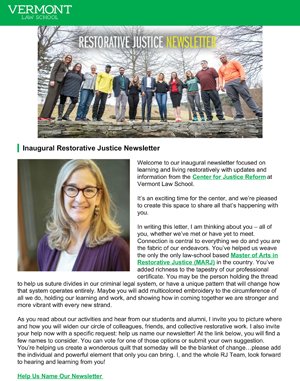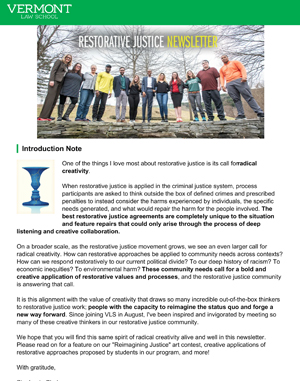Nationally recognized leaders in the environmental justice movement will join activists, scholars and lawyers for Vermont Law School's annual Solutions Conference from 8 a.m. to 5:30 p.m. Friday, March 24, in Chase Community Center at VLS. The conference, titled "Bridging the Gap Between the Promise and the Reality of Environmental Justice," is free and open to the public and press.
Several VLS student groups are partnering to sponsor the conference, the goal of which is to provide understanding of current environmental justice issues and a forum to discuss potential solutions. Special guests include Esther Calhoun of Black Belt Citizens Fighting for Health and Justice; Charles Lee, author of "Toxic Wastes and Race in the United States"; Richard Moore, chairman of the National Environmental Justice Advisory Council to the Environmental Protection Agency (EPA); Quentin Pair, retired United States Department of Justice (DOJ) attorney; and Benjamin Wilson, chairman of Beveridge & Diamond PC.
"We hope our Vermont neighbors will join us in welcoming these esteemed leaders in the environmental justice movement to Vermont Law School," said Sherri White-Williamson JD/MERL'18. "We seek to foster a greater understanding of the challenges faced by low-income communities and communities of color who are disproportionately affected by environmental burdens and hazards, such as inadequate housing, food deserts, toxic and hazardous waste storage and treatment facilities, and lack of access to reasonably priced renewable energy. Regardless of level of expertise, attendees will leave feeling empowered to make a difference and inspired by others engaged in environmental justice work."
The conference schedule includes:
9 a.m.—Welcome: President and Dean Marc Mihaly
9:15 to 10:45 a.m.—Opening Plenary
This session will explore the history of the environmental justice movement. Discussion will range from the seminal report "Toxic Wastes and Race in the United States" to the work of the Interagency Working Group on Environmental Justice, to development of programs at academic institutions to train a cadre of environmental justice advocates.
11 a.m. to 12:15 p.m.—Concurrent/Breakout Sessions
Conference participants will attend a breakout session of their choice. During this time, student facilitators and subject matter experts will lead participants in a discussion of issues and ideas, and brainstorm viable solutions to the problems identified. Each group will report those solutions to the conference later in the day.
Food Deserts and Sustainable Agriculture
Examining Modern Day Environmental Injustice in Puerto Rico
Addressing Barriers to Renewable Energy
Women, Families, and Environmental Justice
Grassroots Organizing for Environmental Justice
12:30 to 2 p.m.—Lunch and Community Voices Panel
This luncheon session will look at the environmental justice movement from a community perspective.
2:15 to 3:45 p.m.—Concurrent/Breakout Sessions
Conference participants will attend a breakout session of their choice. During this time, student facilitators and subject matter experts will lead participants in a discussion of issues and ideas, and brainstorm viable solutions to the problems identified. Each group will report those solutions to the conference later in the day.
Tribal Environmental Justice Issues—Sovereignty on the Front Lines
Title VI, Environmental Justice and Affected Communities
Toxins and Water: Environmental Injustice in Flint and Buffalo
A Common Thread: Environmental Justice in a Changing Climate
4 to 5:30 p.m.—Wrap-Up
Attendees will report the solutions discussed during their various breakout sessions. Ideas will be recorded and distributed to all conference attendees after the event.
Continuing legal education (CLE) credits are available. For more information about "Bridging the Gap Between the Promise and the Reality of Environmental Justice," including preregistration, visit Eventbrite. Preregistration is encouraged to reserve lunch.
###
Vermont Law School, a private, independent institution, is home to the nation's largest and deepest environmental law program. VLS offers a Juris Doctor curriculum that emphasizes public service; three Master's Degrees—Master of Environmental Law and Policy, Master of Energy Regulation and Law, and Master of Food and Agriculture Law and Policy; and four post-JD degrees —LLM in American Legal Studies (for foreign-trained lawyers), LLM in Energy Law, LLM in Environmental Law, and LLM in Food and Agriculture Law. The school features innovative experiential programs and is home to the Environmental Law Center, South Royalton Legal Clinic, Environmental and Natural Resources Law Clinic, Energy Clinic, Food and Agriculture Clinic, and Center for Applied Human Rights. For more information, visit vermontlaw.edu, find us on Facebook, and follow us on Twitter and Instagram.


















